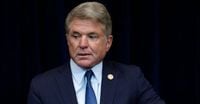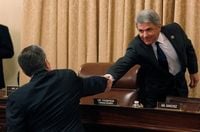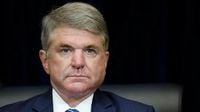Rep. Michael McCaul, a towering figure in Republican foreign policy circles and a fixture of Texas politics for over two decades, announced on Sunday, September 14, 2025, that he will not seek reelection in 2026. The move signals the end of an era for the House of Representatives, with McCaul’s departure marking the loss of one of its most experienced national security and foreign affairs hawks. As he prepares to leave Congress after 11 terms, McCaul is sounding alarms about the escalating global risks—particularly the threat of a broader conflict sparked by Russia’s latest provocations in Europe.
Speaking on ABC’s “This Week,” McCaul, 63, explained his decision to step down while reflecting on a career defined by a relentless focus on defending the United States from global threats. “It’s been an honor to serve for over two decades in the Congress. I’m looking now for a new challenge,” he said, emphasizing his intent to continue working in national security and foreign policy, albeit in a different capacity. “My father’s service in World War II inspired me to pursue a life of public service, with a focus on defending our great nation against global threats, and I have been proud to carry out that mission in Congress for more than two decades,” McCaul stated in a news release, as reported by The Texas Tribune.
McCaul’s announcement comes at a time of heightened international tension. Just days before his retirement news, Russian drones breached Polish airspace, prompting NATO jets to scramble in response. Russia claimed the incursion was an error, but Poland and other European nations insisted it was a deliberate act. President Donald Trump, for his part, downplayed the incident, suggesting, “It might have been a mistake.” McCaul, however, was unequivocal in his assessment. “With all deference to the president, I don’t think that was a mistake. I think Putin is testing the resolve of NATO,” he told ABC’s Martha Raddatz. “We’ve never seen anything like this in recent times. And so, what I’m concerned about is that the escalation here and the temperature rising, we got to be very careful not to be on the precipice of a World War III.”
Throughout his career, McCaul has been a consistent advocate for a muscular U.S. presence on the world stage. As chairman of both the House Foreign Affairs and Homeland Security committees, he helped steer bipartisan legislation supporting military aid to Ukraine, Israel, and Taiwan, and was a leading proponent of the Nonprofit Security Grant Program to protect Jewish and other vulnerable organizations. According to Jewish Insider, McCaul was seen as a bipartisan dealmaker and a key driver behind last year’s passage of supplemental aid packages to U.S. allies abroad.
McCaul’s worldview has been shaped by the seismic events of the early 21st century. “The Sept. 11 attacks changed my life and many others’, but I became a counterterrorism federal prosecutor within the Justice Department. I entered Congress, I chaired the Homeland Security Committee, I saw the rise of ISIS and the caliphate,” he recounted on ABC. “As chairman of Foreign Affairs, I saw Afghanistan fall and [Vladimir] Putin invade Ukraine and the Middle East on fire, and then the threat from Chairman Xi [Jinping] in China and the Indo-Pacific.”
Not one to mince words, McCaul has compared both Russian President Vladimir Putin and Chinese leader Xi Jinping to Adolf Hitler, warning of the dangers posed by authoritarian regimes. He has also been a vocal critic of what he sees as wavering U.S. resolve in the face of such threats. McCaul accused Putin of “manipulating” President Trump, referencing Putin’s KGB past. “I think he’s manipulating the president, as a KGB officer would,” McCaul said, according to ABC News. “The more Putin irritates [Trump], I think, the better we are in terms of defending NATO and Ukraine.”
McCaul’s critique of Trump extends to the administration’s inconsistent stance on Russia. While Trump has at times threatened “major sanctions” and “severe consequences” if Russia continues its war in Ukraine, he has often failed to follow through, letting deadlines slip and sending mixed signals to allies. McCaul, however, remains hopeful that the president is “waking up to the fact that Putin is not negotiating in good faith.” He stressed the need for the U.S. to negotiate “out of strength.”
During his tenure, McCaul also chaired the House China Task Force and worked on bipartisan cybersecurity legislation, recognizing the evolving nature of global threats. His advocacy for robust military and diplomatic engagement has set him apart from a younger generation of Republicans, some of whom are more skeptical about U.S. intervention abroad. Still, McCaul’s influence has been felt across the aisle, with colleagues frequently citing his ability to build consensus on thorny security issues.
The congressman’s departure is part of a broader reshuffling within the Texas delegation and the House at large. Other prominent GOP foreign policy hawks, such as Rep. Don Bacon of Nebraska, are also retiring, paving the way for new leadership on key committees. Meanwhile, redistricting in Texas is expected to keep McCaul’s 10th Congressional District in Republican hands, despite its boundaries shifting to include a greater share of Democratic-leaning Austin. In the 2024 presidential election, the newly drawn district would have gone for Trump by a margin of 60.5% to Kamala Harris’s 37.9%, according to The Texas Tribune.
McCaul’s retirement opens the door for a new generation of Texas Republicans to vie for congressional seats. The recent redistricting has also made several other districts more competitive or more favorable to the GOP, and Rep. Chip Roy’s run for Texas attorney general adds to the list of vacancies. The Texas Republican delegation, already seeing a decline in seniority, faces further losses with the departures of McCaul and Rep. Morgan Luttrell.
Reflecting on his legacy, McCaul expressed pride in his record and optimism about the future. “I am ready for a new challenge in 2027 and look forward to continuing to serve my country in the national security and foreign policy realm,” he said. His long career—spanning roles as a federal prosecutor, chief of counterterrorism and national security for the U.S. attorney in the Western District of Texas, and a lead Republican voice in Congress—has been defined by a steadfast commitment to confronting threats at home and abroad.
As the House prepares to lose one of its most seasoned security experts, the question remains: who will fill the void left by McCaul’s departure? Whether in Congress or beyond, his influence on America’s approach to global affairs will not soon be forgotten.






